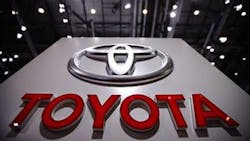Toyota Leadership Changes Signal New Direction, Analysts Say
TOKYO -- A management shake-up at Toyota heralds a new era that will force the firm to look beyond the narrow confines of corporate life in Japan and help it in the global marketplace, analysts said on Thursday.
The world's largest automaker said Wednesday it had appointed three outside board members for the first time, and would appoint non-Japanese CEOs in the U.S., Africa and Latin America, in addition to Europe.
It marks a huge shift for Toyota (IW 1000/5), which had always followed traditional Japanese management practices, with most of its executives and senior managers picked from people who had risen through the ranks.
But its management style had come in for criticism in recent years as too parochial for a global business, and its shortcomings were highlighted by a slow response to the recall of millions of vehicles since 2009 over safety defects.
Analysts said they hoped the changes would lead to a new management approach.
"Toyota's leadership changes portend a new era," said James Post, an expert on corporate governance at Boston University School of Management.
"New directors, drawn from beyond Japan's shores, will help develop a truly global view at the top," he added.
Former GM Exec Joins Toyota Board
The overhaul includes the appointment of Mark Hogan, an American who used to work for arch-rival General Motors, who will become the first foreign businessman to sit on the Toyota board without having come from the ranks of the company.
The two others appointed to the board are Japanese -- Ikuo Uno, executive adviser for Nippon Life Insurance, and Haruhiko Kato, president of Japan Securities Depository Center.
The leadership shuffle came after a few difficult years for Toyota, which included the huge recalls that were both expensive and embarrassing.
"Toyota has always been criticized on its quality of corporate governance," Koichi Sugimoto, a senior analyst at BNP Paribas said. "We expect something positive to come out of this new system."
Critics have also said the traditional Japanese management style practiced by Toyota focused on team spirit and consensus, and produced bosses who tried to avoid making waves and were unprepared to take risks.
However, previous attempts to bring international members onto Toyota's board have not gone well.
The first foreigner promoted onto the board was American Jim Press, who was given a seat in 2007 after nearly four decades with the company. However, he resigned from the post after just five months and went to rival carmaker Chrysler.
President Akio Toyoda said he hoped the shake-up would cement Toyota's recovery from the quake-tsunami in 2011, which hammered production and sales, as well as floods in Thailand that hit key suppliers.
"As the company recovers and increases its sales, I want to build a corporation with a good feeling for what is happening," Toyoda, the grandson of the company's founder, told the Nikkei business daily
Toyota posted record sales in 2012, buoyed by key Asian and U.S. markets, and regained the global sales crown it lost to US rival General Motors the previous year.
Copyright Agence France-Presse, 2013
About the Author
Agence France-Presse
Copyright Agence France-Presse, 2002-2025. AFP text, photos, graphics and logos shall not be reproduced, published, broadcast, rewritten for broadcast or publication or redistributed directly or indirectly in any medium. AFP shall not be held liable for any delays, inaccuracies, errors or omissions in any AFP content, or for any actions taken in consequence.
